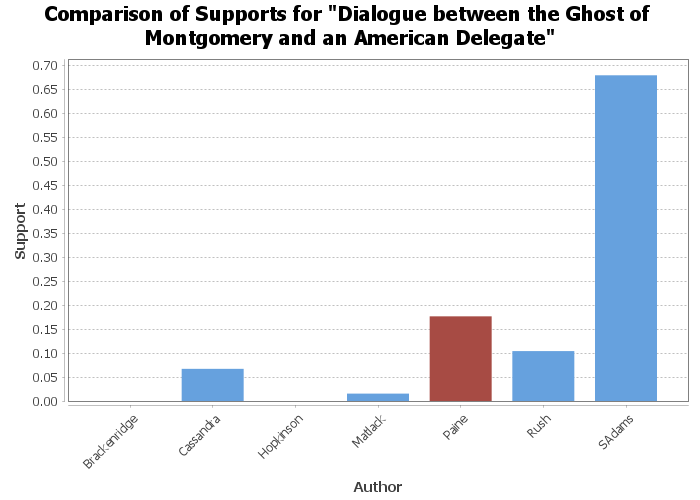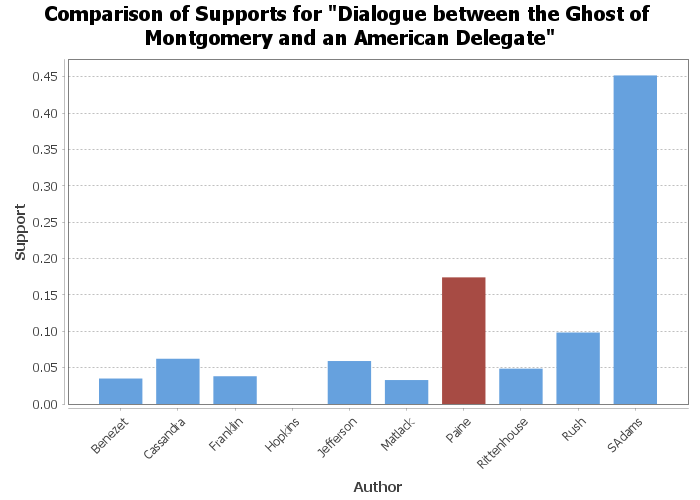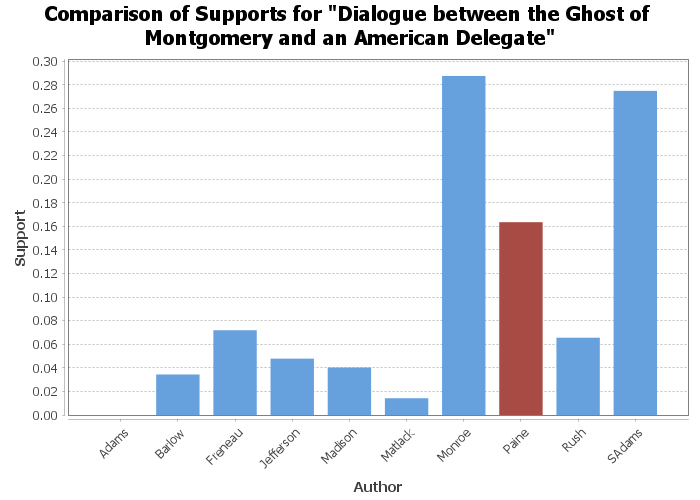Dialogue between the Ghost of General Montgomery and an American Delegate
A Dialogue between the Ghost of Montgomery and an American Delegate, in a Wood near Philadelphia. An homage to A Dialogue between Gen. Wolfe and Gen. Gage six months before, this is most likely Samuel Adams, who may have authored the first as it was set in Boston. Paine registers, but not as high as others, so it is doubtful this is Paine. Some samples from the testing:



Delegate. Welcome to this retreat my good friend. If I mistake not, I now see the ghost of the brave General MONTGOMERY.
General Montgomery. I am glad to see you. I still love liberty and America, and the contemplation of the future greatness of this continent now forms a large share of my present happiness. I am SENT here upon an important errand, to warn you against listening to terms of accomodation from the court of Britain.
Del. I shall be happy in receiving instruction from you in the present trying exigency of our public affairs. But suppose the terms you speak of should be just and honorable.
Gen. Mont. How can you expect these, after the King has proclaimed you rebels from the throne, and after both houses of parliament have resolved to support him in carrying on a war against you? No, I see no offers from Great Britain but of PARDON. The very word is an insult upon our cause. To whom is pardon offered? — to virtuous freemen. For what? — for flying to arms in defence of the rights of humanity: And from whom do these offers come? From a ROYAL CRIMINAL. You have furnished me with a new reason for triumphing in my death, for I had rather have it said that I died by his vengeance, than lived by his mercy.
Del. But you think nothing of the destructive consequences of war. How many cities must be reduced to ashes! how many families must be ruined! and how many widows and orphans must be made, should the present war be continued any longer with Great Britain.
Gen. Mont. I think of nothing but the destructive consequences of slavery. The calamities of war are transitory and confined in their effects. But the calamities of slavery are extensive and lasting in their operation. I love mankind as well as you, and I could never restrain a tear when my love of justice has obliged me to shed the blood of a fellow creature. It is my humanity that makes me urge you against a reconciliation with Great Britain, for if this takes place, nothing can prevent the American Colonies from being the seat of war as often as the King of Great Britain renews his quarrels with any of the Colonies, or with any of the belligerent powers of Europe.
Del. I tremble at the doctrine you have advanced. I see you are for the independance of the Colonies on Great Britain.
Gen. Mont. I am for permanent liberty, peace, and security to the American Colonies.
Del. These can only be maintained by placing the Colonies in the situation they were in the year 1763.
Gen. Mont. And is no satisfaction to be made to the Colonies for the blood and treasure they have expended in resisting the arms of Great Britain? Who can soften the prejudices of the King — the Parliament — and the nation, each of whom will be averse to maintain a peace with you in proportion to the advantages you have gained over them? Who shall make restitution to the widows — the mothers — and the children of the men who have been slain by their arms? Can no hand wield the sceptre of government in America except that which has been stained with the blood of your countrymen? For my part if I thought this Continent would ever acknowledge the sovereignty of the Crown of Britain again, I should forever lament the day in which I offered up my life for its salvation.
Del. You should distinguish between the King and his ministers.
Gen. Mont. I live in a world where all political superstition is done away. The King is the author of all the measures carried on against America. The influence of bad ministers is no better apology for these measures, than the influences of bad company is for a murderer, who expiates his crimes under a gallows. — You all complain of the corruption of the parliament, and of the venality of the nation, and yet you forget that the Crown is the source of them both. — You shun the streams, and yet you are willing to sit down at the very fountain of corruption and venality.
Del. Our distance and charters will protect us from the influence of the crown.
Gen. Mont. Your distance will only render your danger more imminent, and your ruin more irretrievable. Charters are no restraints against the lust of power. The only reason why you have escaped so long is, because the treasure of the nation has been employed for these fifty years in buying up the virtue of Britain and Ireland. Hereafter the reduction of the representatives of the people of America will be the only aim of administration should you continue to be connected with them.
Del. But I foresee many evils from the independance of the Colonies. Our trade will be ruined from the want of a navy to protect it. Each colony will put in its claim for superiority, and we shall have domestic wars without end.
Gen. Mont. As I now know that Divine Providence intends this country to be the asylum of persecuted virtue from every quarter of the globe, so I think your trade will be the vehicle that will convey it to you. Heaven has furnished you with greater resources for a navy than any nation in the world. Nothing but an ignorance of your strength could have led you to sacrifice your trade for the protection of a foreign navy. A freedom from the restraints of the acts of navigation I foresee will produce such immense additions to the wealth of this country that posterity will wonder that ever you thought your present trade worth its protection. As to the supposed contentions between sister colonies, they have no foundation in truth. But supposing they have, will delaying the independance of the Colonies, 50 years, prevent them? No—the weakness of the Colonies, which at first produced their union, will always preserve it, ’till it shall be their interest to be separated. Had the colony of Massachusetts-Bay been possessed of the military resources which it would probably have had 50 years hence, would she have held out the signal of distress to her sister colonies, upon the news of the Boston port-bill? No—she would have withstood all the power of Britain alone, and afterwards the neutral colonies might have shared the fate of the colony of Canada. Moreover, had the connection with Great-Britain been continued 50 years longer, the progress of British laws, customs and manners (now totally corrupted) would have been such that the Colonies would have been prepared to welcome slavery. But had it been otherwise, they must have asserted their independance with arms. This is nearly done already. It will be cruel to bequeath another contest to your posterity.
Del. But I dread all innovations in governments. They are very dangerous things.
Gen. Mont. The revolution, which gave a temporary stability to the liberties of Britain, was an innovation in government, and yet no ill consequences have arisen from it. Innovations are dangerous only as they shake the prejudices of a people; but there are now, I believe, but few prejudices to be found, in this country, in favor of the old connection with Great-Britain. I except those men only who are under the influence of their passions and offices.
Del. But is it not most natural for us to wish for a connection with a people who speak the same language with us, and possess the same laws, religion, and forms of government with ourselves.
Gen. Mont. The immortal Montesquieu says, that nations should form alliances with those nations only which are as unlike to themselves as possible in religion, laws and manners, if they mean to preserve their own constitutions. Your dependance upon the crown is no advantage, but rather an injury, to the people of Britain, as it encreases the power and influence of the King. The people are benefited only by your trade, and this they may have after you are independant of the crown. Should you be disposed to forgive the King and the nation for attempting to enslave you, they will never forgive you for having baffled them in the attempt.
Del. But we have many friends in both Houses of Parliament.
Gen. Mont. You mean the ministry have many enemies in Parliament who connect the cause of America with their clamours at the door of administration. Lord Chatham’s conciliatory bill would have ruined you more effectually than Lord North’s motion. The Marquis of Rockingham was the author of the declaratory bill. Mr. Wilkes has added infamy to the weakness of your cause, and the Duke of Grafton and Lord Lyttleton have rendered the minority junto, if possible, more contemptible than ever.
Del. But if we become independant we shall become a commonwealth.
Gen. Mont. I maintain that it is your interest to be independant of Great Britain, but I do not recommend any new form of government to you. I should think it strange that a people who have virtue enough to defend themselves against the most powerful nation in the world should want wisdom to contrive a perfect and free form of government. You have been kept in subjection to the crown of Britain by a miracle. Your liberties have hitherto been suspended by a thread. Your connection with Great Britain is unnatural and unnecessary. All the wheels of a government should move within itself. — I would only beg leave to observe to you, that monarchy and aristocracy have in all ages been the vehicles of slavery.
Del. Our governments will want force and authority if we become independant of Great Britain.
Gen. Mont. I beg leave to contradict that assertion. No royal edicts or acts of assembly have ever been more faithfully or universally obeyed than the resolves of the Congress. I admire the virtue of the colonies, and did not some of them still hang upon the haggard breasts of Great-Britain, I should think the time now come in which they had virtue enough to be happy under any form of government. Remember that it is in a commonwealth only that you can expect to find every man a patriot or a hero. Aristides — Epaminondas — Pericles — Scipio — Camillus — and a thousand other illustrious Grecian and Roman heroes, would never have astonished the world with their names, had they lived under royal governments.
Del. Will not a Declaration of Independance lessen the number of our friends, and increase the rage of our enemies in Britain?
Gen. Mont. Your friends (as you call them) are too few—too divided—and too interested to help you. And as for your enemies, they have done their worst. They have called upon Russians—Hanoverians—Hessians—Canadians—Savages — and Negroes to assist them in burning your towns—desolating your country—and in butchering your wives and children. You have nothing further to fear from them. Go, then, and awaken the Congress to a sense of their importance; you have no time to lose. France waits for nothing but a declaration of your independance to revenge the injuries they sustained from Britain in the last war. But I forbear to reason any further with you. The decree is finally gone forth, Britain and America are now distinct empires. Your country teems with patriots — heroes — and legislators, who are impatient to burst forth into light and importance. Hereafter your atchievements shall no more swell the page of British history. God will not excite the attention of all Europe — of the whole world — nay of angels themselves to the present controversy for nothing. The inhabitants of Heaven long to see the ark finished, in which all the liberty and true religion of the world are to be deposited. The day in which the Colonies declare their independance will be a jubilee to Hampden — Sidney — Russell — Warren — Gardiner — Macpherson — Cheeseman, and all the other heroes who have offered themselves as sacrifices upon the altar of liberty. It was no small mortification to me when I fell upon the Plains of Abraham, to reflect that I did not expire like the brave General Wolfe, in the arms of victory. But I now no longer envy him his glory. I would rather die in attempting to obtain permanent freedom for a handful of people, than survive a conquest which would serve only to extend the empire of despotism. A band of heroes now beckon to me. I can only add that America is the theater where human nature will soon receive its greatest military — civil and literary honors. —
FINIS.